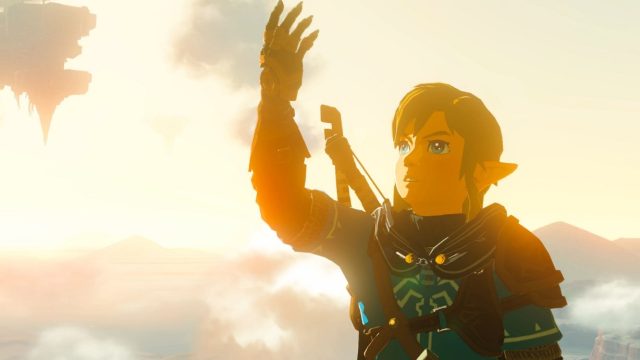This Week You Will Take Journeys of Self-Discovery Through:
- Hyrule
- the Schraderverse
- literary adaptations
- problems in a streaming series
- the ‘Net!
Thanks to scb0212 for sharing his discoveries this week. Send articles throughout the next week to ploughmanplods [at] gmail, post articles from the past week below for discussion, and Have a Happy Friday!
Linda Codega talks to trans fans of the Legend of the Zelda series about the joy they find exploring the word through its main character Link:
Link has been described by many trans people as an “egg-cracker”—someone (or something) who makes people realize they’re transgender. It’s moment of awakening when little pieces of a person’s experience fit into place and trans people begin to understand their life and gender through a new paradigm. For many gamers, Link’s appearance, mannerisms, and even his embodiment of positive masculine traits all create a space where people can inhabit those parts of the character, creating moments of realization in their own lives outside of Hyrule. […] When asked how playing as Link makes them feel, a trans nonbinary fan who wants to be called Stenoscope because “the world exists” says, “Like I can do whatever I want forever. Even if when I turn off the game I’m back in the ‘real world,’ while I’m interacting with Link in all Link’s transness I feel like I maybe make more room for my own transness. I have this sort of unshakeable… faith? Belief? In Link being trans, and being able to have that belief about, you know, pixels, has been really eye-opening about how many hoops I make myself jump through before I feel ‘trans enough.’ Also it makes me want to SURF on a SHIELD.”
Jason Bailey reviews Paul Schrader’s latest film for Crooked Marquee:
You’ve got to give Paul Schrader this: he knows exactly who he is, as a man and a filmmaker, and is going to deliver on it. And if you’ve got any doubt about that, consider that the first post-credit image in his new film Master Gardener is the primary visual motif of his entire filmography (but especially his recent burst of character dramas): a man, alone in a sparsely-furnished room, writing in a journal. “Gardening is a belief in the future,” he reads, in voice over. “A belief that things will happen according to plan. That change will come in due time.” On the heels of the stylish opening credit sequence, where the text splits the screen with time-lapse video of rapidly blooming flowers, we can safely guess that this is not a principle that, in Mr. Schrader’s mind, holds solely true to flowers.
For The Ringer, catches up with journalist David Grann as two Scorsese-DiCaprio adaptations of his work appear on the horizon:
The two films will cement Grann among the likes of Jessica Pressler and Michael Lewis—journalists whose stories resonate so deeply with society that they become part of pop culture. It’s a feat made all the more impressive by the fact that Grann’s stories are often sourced not from financial crises or flashy scammers, but from old documents that occasionally require a magnifying glass to read. His work may offer momentary escape in the form of far-flung locales, or the occasional naval cannon battle, but at its core are timeless themes of striving, survival, and the precarity of truth. In an era when so many film and television adaptations simply mimic our modern reality, Grann’s stealthy history lessons have become a powerful, if increasingly rare, force for scale and meaning in Hollywood.
At Women’s Health, Nylah Burton is “fed up” with the depictions of marital rape in Queen Charlotte: A Bridgerton Story:
And for Black viewers like me, the show’s refusal to engage with these scenes of marital sexual violence has become a disturbing pattern. “A lot of people aren’t realizing that Lady Danbury has no room to consent in these scenes,” Sydney Turner, associate editor at Off Colour Magazine, tells Women’s Health. “She’s never asked if she also wants to have sex. She’s not even really an active participant. It’s concerning to me that a lot of people seem to not be reading it as rape.”
Finally, The Verge‘s Alexis Ong tracks the depiction of the Internet on film and TV from its earlier days as an act that required deliberate engagement and a lot of cords:
For all the effort we made to embed them in our private spaces, cables are now unsightly, outdated things to be made obsolete in the name of convenience. It’s perhaps too fitting a metaphor for basic technological literacy today and certainly a crappier version of a hands-on past when users were forced to learn how their machines generally worked. The cyberpunk dystopia we read about as kids — a much edgier delight in ’80s fiction — has been retconned into a shapeless mainstream aesthetic that, more often than not, forgets the pliable copper threads from whence it came.


